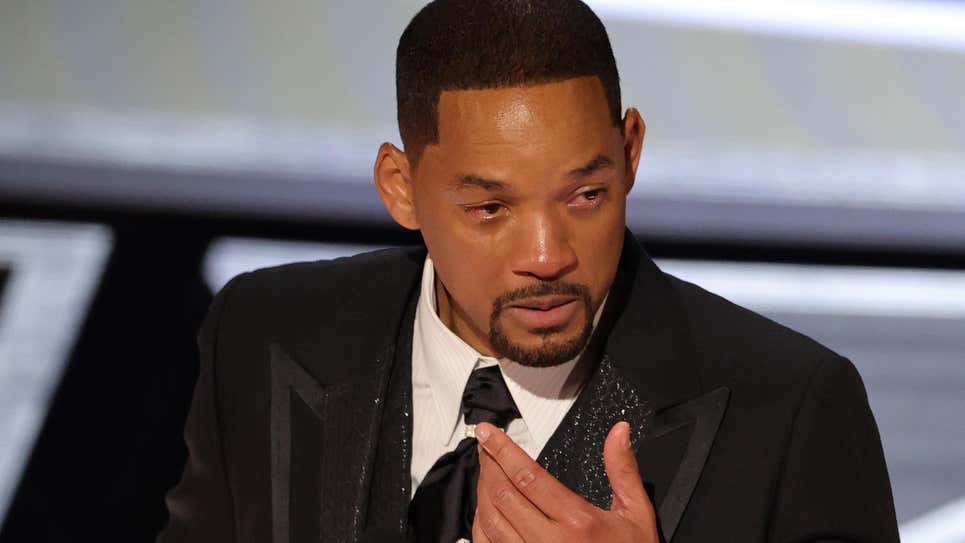Year-end roundtable: How do we feel about Will Smith now?
Almost a year after Will Smith slapped Chris Rock onstage at the 2022 Academy Awards, the moment, and the Academy's response, remains polarizing

In a series of special year-end roundtable discussions, The A.V. Club looks back at the stories that made the biggest impact on pop culture in 2022.
In March 2022, on stage at the Academy Awards, Chris Rock made a joke about Jada Pinkett-Smith’s shaved head. And then Will Smith slapped him. In terms of facts about what happened, that’s really all there is. But the resulting discourse has occupied the better part of this year, and figures to spill into 2023 as the next Oscar season ramps up. How we feel about the moment, and whether or not we think Smith’s actions were justified, are just some of the elements that keep this conversation alive. Here, A.V. Club staffers talk about the infamous slap and the public’s response.
Mary Kate Carr: Like any pop culture nerd I love when the Oscars can produce an enduring, memorable moment, but this one turned out like a monkey’s paw wish. I’m a Will Smith fan, so I hate that it came at the expense of overshadowing not just the work that he did last year but the work he put out this year as well.
Jack Smart: What I’ve fixated on since March 27, 2022—and I know I’m not the only one—is the dramatic irony of it all. Here’s a guy who works for decades building up a reputation, a brand, truly a legacy as one of Hollywood’s brightest stars and most accomplished Black trailblazers, only to see it all come crashing down with one unthinking impulse. And for that to happen moments, mere minutes before his hard-won apex of that long career, winning the best actor Oscar? Ibsen himself could never have scripted such a tragedy.
Matt Schimkowitz: In the moment, I thought it was a bit. My brain could not process Will Smith, the ultimate Hollywood nice guy, attacking Chris Rock on stage over such hack material. This has to be the most anyone has thought about G.I. Jane since, what, 1998? But the slap has to be the most surreal thing to happen at the Oscars at least since the Moonlight fiasco—though I think the most famous man in the room slapping the second most famous man in the room and then winning an Oscar 10 minutes later is something so truly outside the scope of what anyone thought could happen.
MKC: Moreso than the slap itself, the reaction to it has been fascinating to see unfold over the year. Anecdotally, we’ve talked in the office about how there appears to be a generational divide in the reaction—older viewers seem more scandalized and anti-Smith, while younger viewers seem quicker to forgive and more on his side. I definitely fall in the latter category, and I’m surprised when I read things like THR’s roundup of Oscar voters, how many people feel he still needs to be punished even now when, like you said, we’re almost a year out from the actual event.
Cindy White: Speaking as an older viewer (who doesn’t necessarily share that common opinion) I know what you mean. I definitely saw more younger people defending him afterwards. I’m not anti-Smith, but the word I’d use is disappointed. What a shame to compromise what would have been an otherwise triumphant moment when he won the Oscar later in the broadcast. The person I really felt bad for was Questlove, who also had a big win right after it happened, but who’s going to remember that now?
Drew Gillis: I was genuinely surprised to see the reaction when I tuned out of the ceremony and onto Twitter. At my Oscar party, we definitely had the initial reaction of “Was that scripted? What did I just watch?” and when Smith gave his speech, beginning with “Richard Williams was a fierce protector of his family,” the entire room cheered. Going online and seeing Judd Apatow being horrified because Smith could have killed Rock was so out of touch with the group of people I was with when it happened. Not to be especially crass, but I believe there’s truth to the expression “talk shit, get hit”—Chris Rock had been taking cheap shots at Jada for a while, and while it’s his job as a comedian to take shots, I don’t think comedians are above reproach. Of course, it was incredibly humiliating for both men, and you can argue that Smith’s punishment didn’t fit Rock’s crime, but I have to push back against the idea that comedians are beyond reproach.
JS: I’m also more fascinated by the response to the slap than the specifics of the incident itself. Maybe big, public cultural moments like this are Rorschach tests: Do you object to the negative consequences Will faced because it smacks of racial inequality? Do you have a no-tolerance policy about physical violence, as opposed to other forms of violence? Do you find it refreshing to see the polite veneer of public figures fall away to reveal real, human relatability—or put another way, do you just like drama?

 Keep scrolling for more great stories from A.V. Club.
Keep scrolling for more great stories from A.V. Club.